Wednesday Writers Online
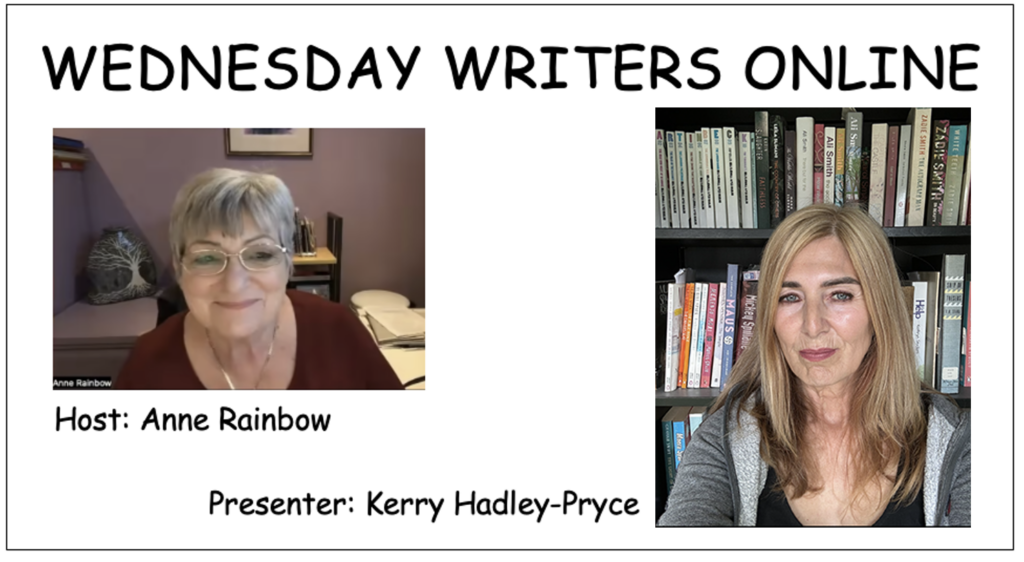 Online creative writing workshops
Online creative writing workshops
Hosted by Anne Rainbow, these sessions will be presented by Kerry Hadley-Pryce.
- Each Zoom session will start at 10am and we aim to complete by 12.30pm but will most likely run to 12.45pm or 1pm to make sure everyone has time to share their work.
- A video of the session is available for a limited time, and all registrants will be emailed a link to the recording. So, if you cannot attend in person on the day, book anyway and you will not miss the fun!
Topics we’ve done to date are listed at the very bottom of this page.
For more details, contact Anne Rainbow on 07721 695044 or by email at an**********@********et.com
2025 dates
These are the dates for 2025
- 15 January, 12 February, 12 March, 9 April
- 7 May, 4 June, 2 July, 30 July
- 10 September, 8 October, 5 November, 3 December
Details of the remaining Zoom workshops in the second block of four are listed below. The topics for Block 3 will be decided, by those who have attended workshops in the past, and announced in late August.
2 July 2025
Ways with Dialogue
 Dialogue in a story is not actually about two people talking to each other — that’s what it *is*, but not what it’s *about*. In this workshop, we’ll explore how dialogue demonstrates and develops character through internal or external conflict.
Dialogue in a story is not actually about two people talking to each other — that’s what it *is*, but not what it’s *about*. In this workshop, we’ll explore how dialogue demonstrates and develops character through internal or external conflict.
- Book your place by purchasing this event only here at a cost of £35.
- And then, please register that you are planning to attend this workshop.
You will then receive your Zoom link, direct from Zoom – and an emailed reminder from me on the morning of the event.
30 July 2025
Writing from the Senses 2
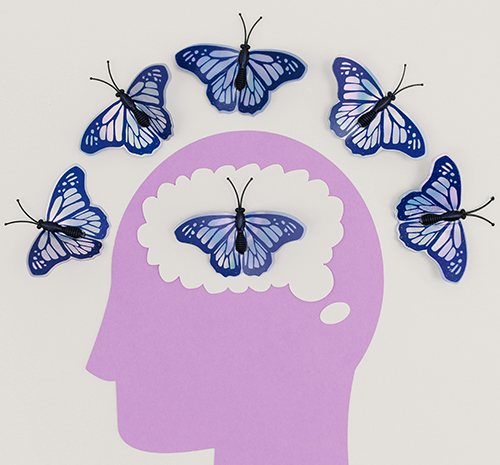 The most ‘utilised’ of our senses as writers is sight. In this workshop, we’ll be thinking about how we might utilise our senses of hearing, smell, taste, touch, emotion – and maybe even ‘foresight’ in order to invigorate our writing.
The most ‘utilised’ of our senses as writers is sight. In this workshop, we’ll be thinking about how we might utilise our senses of hearing, smell, taste, touch, emotion – and maybe even ‘foresight’ in order to invigorate our writing.
- Book your place by purchasing this event only here at a cost of £35.
- And then, please register that you are planning to attend this workshop.
You will then receive your Zoom link, direct from Zoom – and an emailed reminder from me on the morning of the event.
ANNE and KERRY
Anne Rainbow moved from Surrey to Devon in 2006 with her husband, artist Stephen Thomas.
Ha-ha retired, Anne wears many (too many?) hats: writer, mentor, teacher and chat show host – not forgetting (!) wife, mother, grandmother, ….
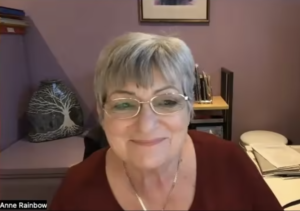
From September 2015, Anne blogged on her ScrivenerVirgin website encouraging writers to use Scrivener, the sophisticated writing tool, which can take an author from blank page to self-published book. She also moderates a Facebook group for Scrivener users on the Mac platform – Scrivener MacHeads – and hosts daily Write-Ins to encourage writers to make writing a daily habit.
In May 2024, Anne hosted the first of her Artists on Air radio shows on SoundArt Radio.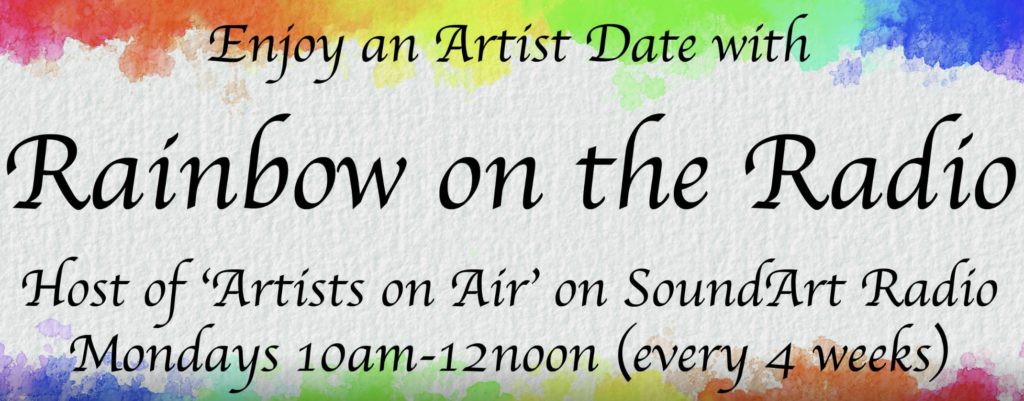
It’s a live show, 10am until 12noon, every four weeks and the guests are all ‘artists’ of one form or another. It’s recorded and available on catch-up. See the News page for the guest list, links to the recordings of past shows and the link to the live show.
Early in 2025, Anne set up a forum on her website, providing a facility for writers to meet away from the ‘noise’ of social media. She closed down her Facebook Group activities, transferring all resources to the new forum. So, individual writers can share news, promote their books, announce book launches, and groups of writers (like those in the Nine Online group, or those who attend Anne’s writing retreats, or the Wednesday writers) can meet privately.
Her ScrivenerVirgin website is also the door to RedPen through which Anne offers online training for writers in self-editing, publishing and marketing. For a few students at a time, this provides access to her RedPen Mentoring scheme.
In her ebook, EDITING The RedPen Way, Anne explains her tried-and-tested approach to self-editing.
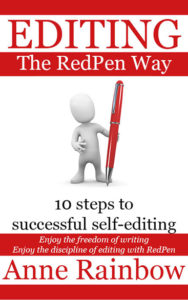
Anne’s objective is always to help budding writers to learn how to edit their own words, and therefore to maximise their chances of having their manuscripts accepted for publication. And, she makes it sound fun!
When Anne is not working with other writers, or devising courses, she makes time for her own writing. Anne has published under two names: Jenny Lawson and Anne Rainbow. Her extensive publishing career of text books in Mathematics, and IT/Computing can be viewed on her LinkedIn profile: www.linkedin.com/in/anne-rainbow-69b3945/. She has also published collections of her poetry and had some short stories appear in anthologies.
Anne’s focus in 2025 is still her 2018 NaNo novel, Dead Wood, and a full length play, Waving, Not Drowning.
She has written three short plays and had all of them performed, script in hand. Running Wild Though Barren Ground was performed at TR2 in 2013, Coming Clean had two nights at The Drum in 2015, and When I have Fears was performed at Bridport Arts Centre in 2017 and then in Kingsbridge in 2019.
Kerry Hadley-Pryce has written fiction for as long as she can remember. She has had a thousand jobs ranging from dinner lady, petrol pump attendant, secondary school teacher to company director, but writing is the best job she’s had. 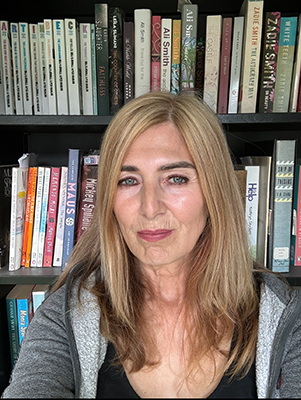 Kerry was born in the Black Country and has a PhD in Creative Writing from Manchester Metropolitan University. She focuses on ‘writing with a sense of place’: how walking practice is linked to the art of writing.
Kerry was born in the Black Country and has a PhD in Creative Writing from Manchester Metropolitan University. She focuses on ‘writing with a sense of place’: how walking practice is linked to the art of writing.
Kerry has enjoyed holidays in the South Hams and attended a Wednesday Writers workshop. She was then invited to be a presenter for 2020 and, on the day we had our Zoom session to decide how to proceed, it should have been her workshop at the Cottage Hotel: Psychogeography as Inspiration for Writing. Instead, the Zoom session resulted in the decision to create Wednesday Writers Online.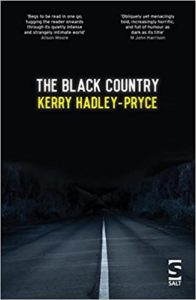
Kerry’s novels and short fiction tend to be dark and unsettling, and are usually set in the Black Country, or at least have a sensation of the place.
Kerry wrote The Black Country as part of her MA at Manchester Writing School at Manchester Metropolitan University, for which she gained a distinction and was awarded The Michael Schmidt Prize for Outstanding Achievement 2013-14.
Her second novel, Gamble was shortlisted for The Encore Second Novel Award 2019.
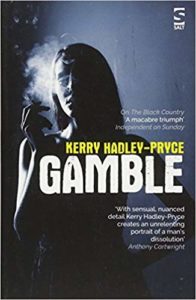
She has had short stories and academic essays published in anthologies and online. She was also appointed the first woman editor of The Black Country Society’s quarterly magazine, The Blackcountryman.
‘God’s Country‘, her third novel, was published in 2023 and formed part of her PhD in Creative Writing awarded by Manchester Metropolitan University in 2023.
‘Lie of the Land’, her fourth novel, was published by Salt Publishing in January 2025.
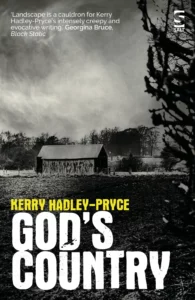 She is working on her next novel now, or can be found teaching and researching creative & professional writing at the University of Wolverhampton, or teaching on Creative Writing Ink, or walking or running alongside the canal thinking about writing.
She is working on her next novel now, or can be found teaching and researching creative & professional writing at the University of Wolverhampton, or teaching on Creative Writing Ink, or walking or running alongside the canal thinking about writing.
Her two dogs, Rufus and Fflei, often assist her.
PREVIOUS WORKSHOPS with Kerry Hadley-Pryce
4 June 2025: Geopoetics of Active Writing
Here, ‘poetics’ doesn’t necessarily mean ‘poetry’, it means playing with language that attempts to express reality in different and original ways and in combinations of different art forms, sciences and thinking. ‘Geo’ relates to the earth, and to the senses that we experience if we allow ourselves. In this workshop, we will experiment with our writing styles and consider how we might sharpen our senses and produce creative responses to our own worlds.
7 May 2025: Thinking about Theme
In this workshop, we worked on finding answers to, and considering ways of firming up, the core idea, or theme of our work. In so doing, we worked out a ‘pitch’ for our work. This workshop’s aims were to help us to think clearly about our creative work, and to work out how to answer the question writers are always asked: ‘What’s it about?’
9 April 2025: Plot, Structure, Timing – When to Reveal and When to Conceal
12 March 2025: Narrative Perspectives
12 February 2025: Flash Fiction 4
15 January 2025: Characterisation Techniques
4 December 2024: Crime and Thriller Writing
What makes a good crime/thriller story? In this workshop, we worked out how to create a story with strong architecture, tension and characters to carry a believable and thrilling plot.
6 November 2024: Embodiment
There is a belief that we carry our memories, our feelings, all our senses and experiences – and those of our ancestors – within us. This meld of thoughts and ideas is often described as ‘messy, sensual and unpredictable’. In this workshop, we explored that belief, and allowed our writing to give voice to our personal meld of thoughts and ideas.
9 October 2024: Nature Writing in Domestic Spaces
We often think of nature as something ‘wild’ that can only be found outdoors, but what about the natural materials, plants and non-human animals we live alongside every day in more domestic spaces? In this writing workshop, we considered what we think of as ‘nature’ and how to foster our own unique relationships with nature.
11 September 2024: Stories from the ‘Ordinary’
In this workshop, we considered the ways Claire Keegan and Cynan Jones seize an ordinary moment and make it extraordinarily poignant.
17 July 2024: Unlikeable characters
We flexed our creative muscles and experimented with writing intriguing, unusual and unlikeable characters.
19 June 2024: Psychic distance
Have you ever started reading a novel or short story and felt immediately drawn in? How do writers do that? In this workshop, we explored ways of using narrative, filmic techniques to manipulate and control our writing and to bring our readers into our characters’ heads and into the story.
22 May 2024: Writing region and identity
The workshop explored ways of working creatively with region and identity in creative writing, particularly with regard to how the former impacts on the latter. It considered the significance of setting, and the extent to which voice and character can be determined by place.
24 April 2024: Novel Planning 2
How do novelists get started on writing their novels? This workshop aims to inspire you to think about how to convert the spark of a new idea through a ‘bare bones’ outline towards the plotting process of your novel.
27 March 2024: Finding Your Voice
Developing our narrative ‘voice’ is an important element of the creative writing process, and finding what works for us – what makes our writing ‘ours’ – is what will make our writing unique. In this workshop, we experimented with different narrative styles to help us to find our own distinctive voice.
28 February 2024: Psychogeography 2
Psychogeography is ‘the study of the precise laws and specific effects of the geographical environment, consciously organised or not, on the emotions and behaviour of individuals.’ In this workshop, we considered our ‘geographical environment’ and how we might convert the effect of it into our writing.
31 January 2024: Using Myth & Fairy Tales
T. S. Eliot said, ‘Mediocre writers borrow; great writers steal.’ And here’s Mark Twain: ‘There is no such thing as a new idea. It is impossible. We simply take a lot of old ideas and put them into a sort of mental kaleidoscope. We give them a turn and they make new and curious combinations. We keep on turning and making new combinations indefinitely; but they are the same old pieces of coloured glass that have been in use through all the ages.’
We looked at ways to harvest the premise of a myth or a fairy tale and to develop our own ways of structuring and owning it.
29 November 2023: Perfecting the Short Story
1 November 2023: Memoir
4 October 2023: Writing Erotica
6 September 2023: Character Creation 2
19 July 2023: Genre Writing
This is a big area of study, but the workshop served to whet our appetites by focusing on the features of a selected list of genres (romance, horror, crime, psychological thriller) in a general way, considering how to make genre writing feel fresh and original. The video of our discussion shows how much we enjoyed listening to each others inventions in response to Kerry’s Exquisite Corpse Game.
21 June 2023: Writing the Uncanny
In fiction, the pleasure of the uncanny is in the sense of disturbance. It’s related to what Mark Fisher called ‘The Weird and the Eerie’. In this workshop, we worked on writing something that makes our readers wonder if what they’re seeing is real, or in their imagination.
24 May 2023: Creating a Villain
We had some fun looking at archetypes and ways to build a ‘villainous’ character who is both compelling and narratively relevant by working on ways of avoiding clichés and stereotypical characters.
26 April 2023: Show and Tell
Both showing and telling are important aspects of a narrative. Here, we looked at how using both can manipulate your readers and make them work a little. We experimented with the art of implication and information as narrative techniques in an effective story.
29 March 2023: Writing the Everyday
Life is full of the hum-drum and unexciting, and this workshop aimed to encourage you to flex those creative muscles by looking at those ‘ordinary’, ‘everyday’ occurrences in a different way and, in so doing, spice-up your narrative style.
1 March 2023: CNF: biography / autobiography
Creative non-fiction (CNF) has been a favourite of ours and, in this workshop, we focused on biography/autobiography, thinking about ways to manipulate language and point of view and the tricky aspect of making personal experiences highly readable.
1 February 2023: Flash Fiction – using creative restraint
In this workshop, we looked further at the important elements of flash/short fiction: brevity, plot and surprise. We considered the effect of creative restraint, and how keeping this in mind will enliven our creative writing.
30 November 2022: Story Endings
The best way to complete a short story course is to explore ‘endings’. In this workshop, we looked at the different ways you could end your story. We’ll read some examples and consider, amongst other things:
- To twist or not to twist?
- Open or closed endings?
- Circular or linear?
2 November 2022: Active Writing
This workshop encouraged us to experiment with our narrative voice by exploring ways to ‘find stories’ and to convey them in an original way.
5 October 2022: Ekphrasis
The dictionary definition of ekphrasis means ‘to describe a work of art,’ and ekphrastic writing has traditionally been associated with poetry, but we’ll be using it to inspire short stories. We considered how visual images can work for us creatively, illustrating how art and image can both inspire and inhabit our short stories.
7 September 2022: Stealing Stories
T. S. Eliot said, ‘Mediocre writers borrow; great writers steal.’ And here’s Mark Twain: ‘There is no such thing as a new idea. It is impossible. We simply take a lot of old ideas and put them into a sort of mental kaleidoscope. We give them a turn and they make new and curious combinations. We keep on turning and making new combinations indefinitely; but they are the same old pieces of coloured glass that have been in use through all the ages.’
In this workshop, we looked at ways to harvest the premise of a story and to develop our own ways of structuring and owning it.
6 July 2022: Honing Your Craft
We explored ways to make ourselves better writers, and ways of selective listening to our inner critic by looking at ways to:
- Experiment with different styles
- Be bold with form
- Get out of our comfort zone
8 June 2022: Creative Non-Fiction Revisited
We explored forms of non-fiction and what makes creative non-fiction by looking at ways to:
- Write about something we know in a creative and imaginative way
- Access our creative skills to inform and explain
- Summon ideas from our memory and write them in an original way
4 May 2022: Adding Humour To Your Writing
We explored ways to a sense of humour to your writing by looking at ways to:
- Turn everyday moments into funny stories
- Connect with your audience on a different level
- Design characters/setting/dialogue that amuse and entertain
(PS: You did not have to be a comedian or even consider yourself a ‘funny person’ to attend and enjoy this workshop.)
6 April 2022: Writing From The Senses
We explored ways in which we can use all our senses to create writing that engages our reader by looking at ways to:
- Use six different types of sensory imagery
- Use our observations and reactions to the everyday
- Tap into our own sensory experiences and convey them in writing
2 March 2022: Travel Writing
We explored what ‘Travel Writing’ is, or could be, by looking at ways to liberate our thinking about what a ‘journey’ is. We considered the four key elements of travel writing
-
- Sense of place
- Symbolism of journeys
- Stories/journeys as transformative experiences
- Narrative voice
2 February 2022: Finding Your Inspiration
We explored ways to stimulate creativity and to encourage that genie out of the lamp by looking at how to invigorate your imagination, write what you don’t know and to be brave and explore ideas.
1 December 2021: Creative Non-fiction
There is a growing interest in this genre, which is an umbrella term for a mix of descriptive and factual writing. For those who’ve read and enjoyed anything by Robert McFarlane or Rebecca Solnit, or liked to write something autobiographical, or felt driven to write something about ‘place’ or ‘landscape’, this workshop provided some ideas about how to get started.
3 November 2021: Flash!
There are many definitions of flash fiction but the important thing to remember is that flash fiction is a short, short story, usually defined in terms of word count. Not only can flash fiction be read in a flash, but it can also be written in a flash. In this workshop, we experimented with prompts and ideas, and working out ways to create complete, engaging fiction with a limited word count.
6 October 2021: Planning your Novel
Writing a novel is a huge undertaking. It’s fun, for sure, but planning it is the first step. In this workshop, we enjoyed a whistle-stop tour of the basics of plotting the plot, the importance of characters and finding your voice.
8 September 2021: Short Stories
How exactly do you write a short story? In this workshop, we looked at the components of the short story form, including getting started, responding to inspiration, and narrative and character arc. We looked at some excellent examples of short stories and writing the first draft of one of our own.
30 June 2021: Literary Fiction – How do you do that?
We explored what makes a creative piece ‘literary fiction’ and what techniques define it?
2 June 2021: Creating Obstacles
Readers love it when you make life difficult for your characters. In this workshop, we tackled how to create carefully planned obstacles which affect the tone and atmosphere of your story, and keep your reader turning those pages.
5 May 2021: Using Dialogue
In this workshop, we looked at how to convey believable, naturalistic dialogue to enrich your characters and make your writing flow.
7 April 2021: Generating the Hook
This workshop was all about how you lure your reader towards the end of a chapter, or section of your writing, by escalating the tension with a fictional ‘hook’.
24 March 2021: Museum of Emotion
This workshop was all about writing ‘from the senses/emotions’ to create a unique and evocative setting. We created vivid and original locations within which to set our stories.
10 February 2021: Time and Pace
The pace of your narrative is vital in order to keep your reader engaged, Judging timing is crucial for creating narrative drive.
This workshop examined how you can manipulate your writing by quickening and slowing the pace using flashbacks and story structure.
13 January 2021: Juxtapositioning
Juxtapositioning is a technique used in creative writing that places different, contrasting aspects of a narrative together in order to create a unique and interesting effect. The workshop identified how to use juxtapositioning in order to create an original and entertaining slant in your writing.
9 December 2020: Symbolism and Suspense
Symbolism is a literary device that uses, for example, abstract ideas, items, locations, the weather or people to represent or symbolise something beyond the literal.
Suspense is a literary device that authors use to keep their readers’ interest alive throughout the work. It is a feeling of anticipation that something risky or dangerous is about to happen.
This workshop looked at examples of these two literary devices in the work of writers like Sandra Arnold, Daphne Du Maurier, and Laura Van den Berg.
18 November 2020: Character Creation
This workshop looked at the importance of characters as elements of storytelling, types of characters, ways of developing richer characters and avoiding character stereotypes by considering ‘what if?’, and the importance of dialogue in creating and conveying our characters.
20 October 2020: Flash Fiction
We explored the term flash fiction but the session was mostly about being brutal with our work (editing?) and pushing the boundaries of our own work and style.
23 September 2020: Psychogeography
Kerry Hadley-Pryce specialises in psychogeography – how place affects us and can be used to good effect in our writing.

